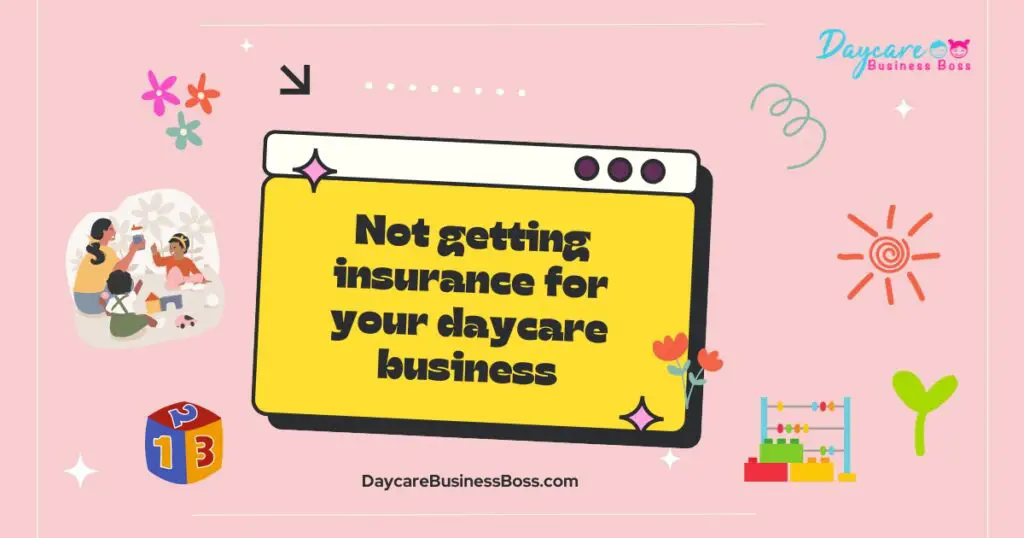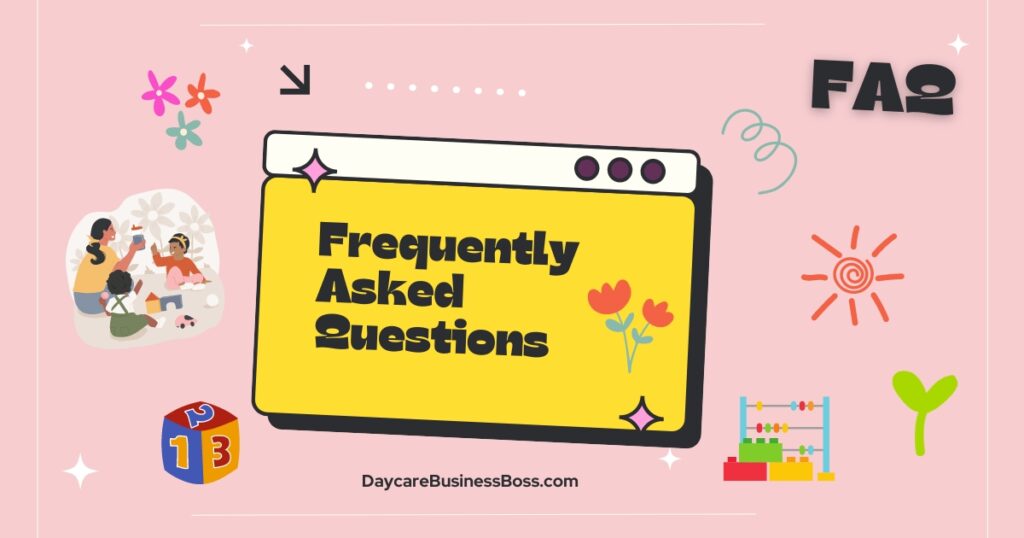Are you starting out a daycare business and are just learning the ropes? One more thing to do after doing your research about starting a daycare is to learn about the mistakes that new daycare owners make and how to avoid them. It’s best to learn from other people’s mistakes to save yourself the cost that you may incur from making the same mistakes. Remember that you’re just starting out and will need every resource you can get. So, losing resources to mistakes is not an option when they can be avoided.
Here are 8 new daycare mistakes to avoid as a new daycare owner:
- Not doing proper market research.
- Not getting insurance for your daycare business.
- Undercharging or overcharging for your daycare services.
- Not marketing your daycare services.
- Not treating your daycare as a business.
- Not putting contracts and policies in writing.
- Not knowing the legal requirements of owning a daycare in your state.
- Not requiring a (non-refundable) deposit.
Not doing proper market research
Before doing anything towards the start of your daycare, the first thing to do is market research. Some people don’t see the need for market research because theirs is ‘only a home-based business’. Remember it’s still a business. Some other daycare owners don’t know how to go about it.
Many daycare owners like to think of their target market as working parents. While this is correct, the demographic is too broad, and you should streamline it to your particular locality. If you look closely, you’ll find that your locality has unique childcare needs that you can build your daycare business to cater to.
Market research doesn’t have to be a huge project that takes weeks or months and a lot of brainstorming. The easy way to go about this is to make a couple of phone calls to parents in your community or have physical conversations with them. Visit existing daycare facilities in your community and ask questions. This should take a few days or a maximum of a week. As you do this, remember that your aim is to know what childcare gaps exist in terms of what parents would like to have but can’t get from existing childcare facilities.
For example, if you live in an area with large companies that run evening and overnight shifts, you probably have parents who would want someone to look after their kids before or after school or till the end of the evening shift. This is something you may want to consider offering especially if no daycare in your neighborhood is doing that.
By doing a proper market research you can understand your target clients and know how best to attract them to your daycare.
Not getting insurance for your daycare business

Most new daycare owners- home-based daycare owners- make the mistake of thinking that their homeowners’ policy can cover for any business liability that they may encounter. What they don’t know is, a homeowners’ policy cannot provide enough cover for certain business liabilities.
Therefore, the key to your peace of mind is to buy a business insurance policy that can cover your daycare business. Unlike what most people think, it is not expensive to get your daycare insured. Before you pay for any insurance policy, find out which one suits your business needs and how much it costs.
Undercharging or overcharging for your daycare services
It’s a no-brainer that how much you charge determines how profitable your daycare is. If you undercharge your customers, you’ll short-change yourself and reduce the profitability of your business. If you overcharge, you may have a close to empty daycare. The key here is to strike a good balance and ensure your rates are friendly enough to bring you enough profit.
One good way to do this is to find out how much other daycare facilities charge. You may need to visit or make phone calls to these facilities or parents that patronize them to ask what their rates are. Many daycare businesses charge more for infants than for older kids. You may want to know what these rates are and adjust yours accordingly.
Note that you don’t have to charge the exact rates as your competition. It should only serve as a guide for you when you charge your customers.
Not marketing your daycare business
Many new daycare owners expect to have parents flocking in with their kids as soon as they open their doors without any form of marketing. With no prior track record of running a daycare, you’ll have to put the word out to create awareness about your business.
Fortunately, there are inexpensive ways to do this. It is usually said that word-of-mouth is the best form of advertising. This is true because parents are more likely to put their kids at a daycare that is recommended by a friend or family member than at a new one they know nothing about. Tell everyone you know about your new daycare business. You can also place ads in your local newspaper, or get local groups in your community or elementary schools to advertise your daycare in their newsletters.
Not treating your daycare as a business
Your daycare is a business, not a charity and you should treat it as such. This may make you seem too strict for people who are close to you. Eventually, they’ll adjust to your terms. Portray a professional attitude when dealing with parents, so they can take you and your business seriously. By doing this, you’ll avoid the extra requests parents are likely to make- such as being late to pick up their kids at no cost.
Not putting contracts and policies in writing
It is important to not only have a verbal agreement with parents, but also to have it in print. It becomes binding when it is in print. Your contract should include the names of the parties involved, daycare hours, terms of payment, the procedure for termination of contract, and the signatures of both parties. It should be written in clear language to avoid any misunderstanding.
Create a policy handbook which will be a detailed document of your rules, how you will care for the kids, what you do in special situations, and other terms of your daycare services. If possible, give every parent a copy and have them read it and agree to it by signing a portion of the handbook. Ensure you include penalties for breaking any of the rules. An example is late fees.
Contracts and policy handbooks are of no use if you don’t enforce them. Make sure you enforce them in dealing with parents and their kids. Having a written contract or policy handbook will save you the stress of saying the same things repeatedly. However, make sure to go over the important parts of the contract or policy handbook verbally with parents. If you have a website, upload a copy of your policy handbook for easy accessibility.
Not knowing the legal requirements of owning a daycare in your state
It is important to operate your daycare according to the legal requirements of your state. This protects you, your business, and the kids in your care from any issues that may arise. Your state may require you to get certain licenses or certifications. Getting them usually involves some paperwork and periodic inspection of your daycare, but it is usually worth it. Having these licenses and certifications will make parents trust your daycare better. You’ll also be able to charge higher rates if you want to.
Not requiring a (non-refundable) deposit
There’s no better time to enforce payment of a deposit than when you open your doors to start your daycare. It will save you a lot of stress collecting debts from defaulting parents. Have parents pay upfront for a week or two before their kids start daycare. This payment can go towards the last week(s) of the child in your care. This way, you can ensure that you get a notice from the parent before they terminate their contract with you.
As a new daycare owner, it is better to learn from other people’s mistakes to avoid wasting your limited resources. It’ll also save you a lot of headaches and help you focus on running your daycare successfully.
Related Questions

- How profitable is a daycare business?
A daycare business may not be as profitable as other small businesses, but it is rewarding on many levels when compared with other businesses. A daycare owner may earn between $4,000 to $10,000 a year caring for infants alone or between $2,000 and $8,000 a year looking after older kids.
- Must I get a license for my daycare business?
If you want to care for more than three kids at a time, consider getting the required license for running a daycare in your area. Visit your state’s website or county office to know what the requirements are. It’s usually better to get the required license at the onset of your business to avoid any hassle that you may encounter in running your daycare.
Please note: This blog post is for educational purposes only and does not constitute legal advice. Please consult a legal expert to address your specific needs.
Avoid mistakes and get off to a good start with our startup course and documents.

Meet Shawn Chun: Entrepreneur and Childcare Business Fan.
I’m a happy individual who happens to be an entrepreneur. I have owned several types of businesses in my life from a coffee shop to an import and export business to an online review business plus a few more and now I create online daycare business resources for those interested in starting new ventures. It’s demanding work but I love it. I do it for those passionate about their business and their goals. That’s why when I meet a childcare business owner, I see myself. I know how hard the struggle is to retain clients, find good employees and keep the business growing all while trying to stay competitive.
That’s why I created Daycare Business Boss: I want to help childcare business owners like you build a thriving business that brings you endless joy and supports your ideal lifestyle.

